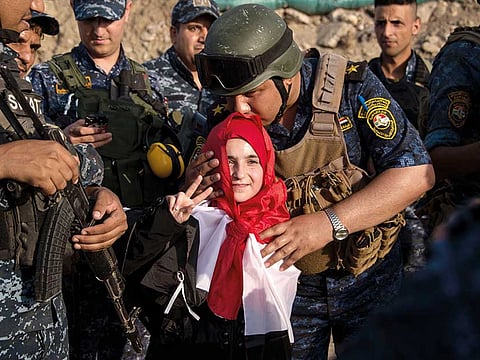Mosul liberation leaves Iraq counting cost of Daesh rule
Three years of occupation left a trail of human misery and devastation and could cost $100b to rebuild

Mosul: Soldiers cleared explosives from Mosul’s historic quarter after its liberation all but ended Daesh’s presence in Iraq, three years of occupation that left a trail of human misery and devastation that could cost $100 billion to rebuild.
Power and water supplies will be restored in the first phase of a 10-year program to rebuild Mosul, much of which was reduced to rubble during nine months of fighting, Planning Ministry spokesman Abdul Zahra Al Hindawi said by phone on Monday. But in a sign of the immense challenges ahead, he estimated that reconstructing all areas of Iraq that fell to Daesh would cost at least $50 billion, and maybe double that amount. Iraq wants to hold a donor conference in Kuwait by early next year.
“The government is intensifying efforts to restore life in the destroyed areas,” Mudher Saleh, economic adviser to Prime Minister Haider Al Abadi, said by phone. Daesh — which was welcomed in parts of western Iraq as well as Mosul by some Sunni residents angered by economic neglect and mistreatment by security forces — will look to use any disenchantment once families return to destroyed communities to “incite riots again,” he said.
Al Abadi declared Mosul’s liberation in a visit to the ravaged city on Sunday. The victory marks a major blow against Daesh, whose leader Abu Bakr Al Baghdadi made his first speech as self-proclaimed ‘caliph’ from one of the city’s mosques in 2014. The group’s ability to attract foreign fighters is also dented, although it continues to inspire militants abroad who have staged terrorist attacks from London to Tehran.
As the major clashes ended, a line of tired civilians filed out of Mosul’s Old City on foot, past the carcasses of destroyed apartment blocks lining cratered roads. While Mosul was Daesh’s last main urban centre in Iraq, it still controls several areas in the west and northeast of the country, including Hawija near Kirkuk.
Nofal Al Hammad, the governor of Nineveh province, whose capital is Mosul, said Sunday that destruction in the city’s west, where the military campaign entered its final phase in mid-June, is 30 times greater than in the east, liberated in January, according to a report by the Rudaw news agency. The United Nations has said as many as 150,000 residents were trapped in the Old City when the battle there began, with illness and disease spreading as clean drinking water, food and medicine ran low.
Saleh, Al Abadi’s adviser, said Iraq would need the help of the US-led coalition that bolstered the war effort against Daesh, as it rebuilds. “We count a lot on this military alliance that helped Iraq to be an alliance for reconstruction,” he said.
The economic challenges facing Al Abadi’s government are massive. Iraq’s non-oil sector, which employs the majority of the workforce, shrank in each of the years following Daesh’s takeover of major cities — with contraction reaching 10.3 per cent in 2016, according to the International Monetary Fund. Iraq reached a $5.4 billion loan agreement with the IMF in May last year to help Opec’s second-biggest producer repair public finances damaged by the plunge in oil prices and war with Daesh. The government has repeatedly said it should be exempt from Opec’s production cuts as it rebuilds its war-torn economy.
Nabeel Khoury, a former US State Department official, said the military plan to defeat Daesh had been carefully crafted to ensure everyone stuck to their role, and it largely went well. “Now, a comprehensive plan is needed for the aftermath,” especially an economic one “to prevent radicalisation and to show concern for the people and the city,” Khoury said.
Sign up for the Daily Briefing
Get the latest news and updates straight to your inbox

